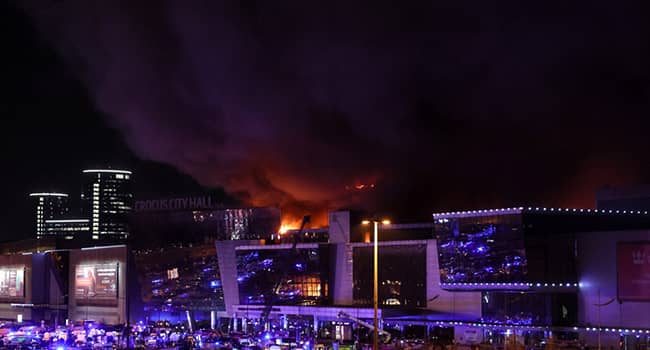Russia’s FSB security service reported that four individuals detained on Sunday in a thwarted “terror” scheme had supplied funds and weapons for the deadly assault on a Moscow concert venue last month.
More than 140 individuals were killed when armed individuals invaded the Crocus City Hall venue on March 22 and subsequently set the structure ablaze, marking the deadliest attack in Russia in twenty years.
The FSB announced on Monday that it had apprehended a quartet in the southern Dagestan region a day earlier, asserting they “were directly involved in the financing and provision of terrorist resources to the perpetrators of the attack on 22 March at the Crocus City Hall in Moscow.”
On Sunday, Russia’s national anti-terrorism committee revealed the capture of three individuals who were “plotting to carry out a series of terrorist offenses.”
The FSB stated on Monday that four foreign nationals had been seized in the operation in the regional capital Makhachkala and the nearby town of Kaspiysk.
The Interfax news agency cited an FSB video featuring one of the detained men confessing, “I provided them with weapons, those individuals who attacked Crocus City Hall. I sourced weapons for them from Makhachkala.”
Russian authorities had previously announced the detention of 12 individuals allegedly linked to the attack – including the four suspected gunmen, who have been identified as Tajik citizens.
The Islamic State (IS) has claimed responsibility for the massacre, citing it as the most deadly act it has ever carried out on European soil, although President Vladimir Putin has emphasized a Ukrainian and Western connection.
Kyiv and the West have consistently denied any involvement, and accused Moscow of “exploiting” the tragedy.
Dagestan is a region in Russia’s southern Caucasus with a Muslim-majority population.
The FSB has faced scrutiny for its failure to prevent the attack, despite both private and public warnings by the US intelligence community about “extremists” planning an “imminent” attack on “large gatherings” in Moscow.
The agency frequently announces the disruption of alleged “terrorist cells”, but in recent months, it has primarily publicized the arrests of what it describes as pro-Ukrainian saboteurs plotting attacks on Russian military facilities and infrastructure.
Russian President Vladimir Putin labeled the attack a barbaric act of terrorism, pledging to punish the perpetrators.
On Saturday, he stated that it had arrested 11 individuals, including four gunmen.
He declared Monday a national day of mourning and emphasized the tightening of security measures throughout Russia.
The Islamic State group said four of its members had been arrested after they attacked a concert venue near Moscow, resulting in the deaths of 143 people. This occurred a day after Russia attributed blame to Ukraine.
AFP



